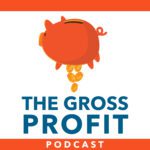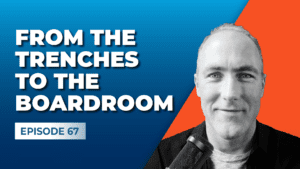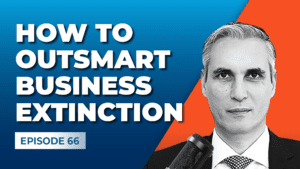

Every hero has an origin story. We think of Spiderman getting bitten by a radioactive spider, Superman discovering he has superpowers, and the X-men congregating around Professor Xavier. And as the saying goes, not all heroes wear capes, so today we discuss the origins of ProcurementExpress.com.
Today we tell the story of how ProcurementExpress.com was formed to solve the problems of two business who reached out for help. But this episode is more than the mere retelling of a story. As we share the situations of two companies who had problems no one else could solve, we will see patterns and situations we recognize today. In the retelling of the story, we will hear familiar problems in a fresh context, and encounter the solutions in novel ways.
On this episode you’ll hear:
- The business context in which ProcurementExpress.com began
- The story of one company that asked for help simplifying their purchasing system
- The story of another company that asked for help preventing fraud and embezzlement
If you’re interested in the origins of our story, and how they can help you understand your own heroic journey, then this is one episode you won’t want to miss.
Resources
Transcription of This Episode
The Gross Profit podcast is your one stop shop on the path to profitability. Each week we share authentic advice on the positive, practical steps you can take to make the company you love more profitable. If you’re looking for a positive plan to help you avoid common spending mistakes, control costs, and increase your profits, then this is the place for you.
I’m Ryan Cowden and this week we’re joined by our host, James Kennedy and Richard Greenane of Procurementexpress.com. In this episode of the Gross Profit podcast, James and Richard discuss and reflect on the beginnings of Procurementexpress.com. Every hero has an origin story. We think of Spiderman getting bitten by a radioactive spider, Superman discovering his superpowers and the X-men congregating around Professor Xavier. And as the saying goes, not all heroes wear capes. So today we discuss the origins of Procurementexpress.com. Today we tell the story of how Procurementexpress.com was formed to solve the problems of two businesses who reached out for help.
But this episode is more than a mere retelling of a story. As we share the situation of two companies who had problems no one else could solve, we will see patterns and situations we recognize today. In the retelling of the story, we will hear familiar problems in a fresh context and encounter the solutions in novel ways. On this episode you’ll hear the business context in which Procurementexpress.com began. We started as an IT support company, but when some of our clients started asking me for help with their purchasing and spending, we went looking for solutions. When we couldn’t find any, we decided to do something about it ourselves and Procurementexpress.com was born. Next we’ll share the story of one company that asked for help simplifying their purchasing system. One of the leaders in this company had to travel a lot for work and his company didn’t have a way for him to authorize purchase orders while he was on the road. We were able to set up a cloud-based solution that allowed his company to authorize purchases so the work didn’t stop when he traveled.
Then we’ll share the story of another company that asked for help preventing fraud and embezzlement. This company discovered that their general manager was using his position to allocate company products and sell them illegally on the side for his own profit. When this came to light, they realized their procurement system was too complicated and they needed a way to monitor it for their own financial security. If you’re interested in the origins of our story and how they can help you understand your own heroic journey, then this is one episode you won’t want to miss. There’s a lot of actionable advice in this episode, so grab something to write with because you’re going to want to take notes. As always. I’ll be back on the other side to wrap up any loose ends. So without any further ado, here’s our conversation with James Kennedy and Richard Greenane.
Welcome to another episode of the Gross Profit podcast. My name is James Kennedy. I’m the co-founder and CEO of Procurementexpress.com where we help hundreds of companies manage billions of dollars they spend.
And today on the podcast I have someone I’m going to interview but someone I know very well, I probably spend way too much time with already either virtually or physically, which is Richard Greenane who is my co-founder and COO of Procurementexpress. Hi, Rich, how are you today?
Hey, how are you doing? Doing very well.
So the purpose of the episode today is to get a little bit of origin story. My son, Max, is just getting into all the Avenger stuff and everything and he’s obsessed with how characters have origin stories for what? And I thought it would be good but on a record the origin story for Procurementexpress for people who are out there who may be existing customers who are interested or maybe new customers just want to know who they’re dealing with. This is an attempt to do that. So I’m going to interview Rich on how we got started and follow up with some questions on what it’s like to run a business. So Rich, tell us the story. How did Procurementexpress.com get started?
Okay. So many moons ago I ran an IT support company in the center of Dublin. So we looked after about 60 different customers with all their IT support needs. So anything they needed in terms of computing or telephony or any of that, we looked after it, installed it, set it up, managed it, all of those things. And then one day at the very beginning of January in 2014, two of my customers phoned me in the same week and essentially asked me for the same product. They had two different kind of headaches or pains that they wanted to solve, but really the product they were looking for was a purchase order system, some way to manage their spend. So those two different companies had that need. And essentially a light bulb went off in my head.
I went looking for those products and none of the products that I could find really fitted with what they were looking for. They wanted a cloud-based solution because some of them are on the road a lot. They wanted something that was simple and easy and straightforward to use. And I couldn’t find anything that really fit the bill. So I knew you, James, from way back. And so I spoke to you about it and actually it seemed like it might be a good product that we could create and have our first two customers there to boot.
Well, from memory, Rich, you asked Oisin first and he was busy and then you asked me.
Well, perhaps. All right, fair enough. Perhaps Oisin came first. I don’t know.
Okay, so tell us what was the impetus for the first company? What were the two companies involved and what were their problems? Okay. Yeah. So UNICEF were the first company that were involved. The Irish side of UNICEF were a customer of mine from the support side for a long time. I knew them very well. And the deputy CEO was there. Basically what happened with him is that he got sent off to a lot of different projects. So UNICEF deal with a lot of different projects in different parts of the world, South America and Africa and places like that. And he would get sent off to visit these projects and see what they were doing and so on. He was the authorizer, the approver on most of the spend within the organization. And so it meant that when he came back from those projects … he may have been away for two weeks at a time … he would have a massive stack of purchase orders on his desk that he would have to deal with.
He would go to all of his teams and sit down with meetings and say, “Where are you at with those things you’re working on?” And essentially they would be sitting there saying, “Well, we’re waiting for you to sign off on this and sign off on that.” And because the things weren’t signed off because he was away, consequently, they weren’t necessarily done. So when he came back he’d have to go spend a whole day going through and signing off and looking at different budgets on spreadsheets and making sure all of the money was there. All of that stuff. And what he wanted is some kind of system that he could authorize that stuff while he was on the road and make sure he could do it from his mobile phone, make sure that he could log in and see what was going on and see where the budgets were at so that once everything was authorized, his team could be working while he was away. And then when he came back, he didn’t have that huge stack of purchase orders on his desk because that was a big pain for him, personally.
Okay. So spin forward five years later. This is something I think we see all the time with our customers. Someone’s waiting for a decision, therefore someone else effectively sits on their hands, and there’s a burn rate associated with that time. Guessing all those guys in UNICEF needed the authority, but they didn’t have the authority to move a project forward. Yet they’re still obviously getting paid every day and that was a big cost to the organization.
Yeah, absolutely. Yeah. In terms of pure money in terms of spending, as you say, of salaries and also in time, not getting all of those projects running and finished on time, that’s probably added a significant amount of time to those projects and how long they took to complete.
Because I see all the time … sometimes it can be a challenge for, let’s say, specialty people on the ops side. You might say, “I want to bring a new software package in like Procurementexpress.com. It’s gonna save me time.” And leadership come in like, “well, I’m paying you anyway. What does it really matter?” There can be that attitude in some other organizations. What I always say to people that are not situation is, “Well, think about what’s actually not getting done. If I’m not being productive, it’s not so much the hourly rate, it’s the hourly rate of everyone I’m blocking, especially on a construction site, somewhere like that. Those costs can rack up hard and fast. So tell us about the other company that got us started.
Yeah. For the other company, a cosmetics firm in Dublin, Clarins Cosmetics, they had a problem whereby their general manager was actually stealing from within the company. Essentially what he was doing was allocating items, product to some kind of account that said that product was no longer needed or it was just a sample list.
So he’s allocating real product to that sample list or to that kind of suspense account. And then he was selling that product to somebody else on the cheap. That person he was selling it to absolutely believed that they were buying from the real Clarins Cosmetics. They didn’t realize that they were just buying from this guy. And then they were actually paying him directly into his own bank account. So that way he was selling the product, not paying for the product that he was selling and he was putting it in this suspense account and then selling it on to somebody who consequently then was selling it in market stores in different parts of the UK and Northern Ireland, which is how the guy got caught in the first place.
So Clarins Cosmetics came to me and said, “Well, actually we don’t really have a really good way … We’ve realized that we don’t have a good way of allocating spend or managing our spend or tracking our spend for things that are getting spent.” And the owner of the company at the time was very, very worried about spending anything or at least spending anything without his authorization. That was a problem for the company as a whole because you’ve got 20 or 30 staff that need spending decisions to make, but when the owner is kind of scared to actually allow anybody else to make those spending decisions because there’s no real process in place, that becomes very, very difficult to get that approval, to get that stuff done, to get those projects seen through. The marketing stuff and all of that spend becomes very difficult to get approval for because there’s only one person doing that approval and that person is kind of out of the office a lot and on holiday and all those kinds of things.
So they needed some kind of system that could manage that process to make sure that there was comfort given to the owner of the company so that he knew that everything was being done correctly and also to kind of empower the rest of the staff so that some of those staff members, like the new general manager, could approve certain things up to certain limits and so on. So the owner was kind of comforted that everything was done right and that kind of thing. And that’s what they were looking for. So the same system, but slightly different in terms of the pain points that they felt.
So he thought he was golden or he was getting away with it because he was allocating the stock to that code which said it was basically wastage or samples or whatever. It wouldn’t get caught up in a stock tank.
That’s it.
That’s worrisome.
Well the interesting thing here is that they were, and still are … Their fulfillment is done by a different company. So they are essentially like a Coca-Cola type marketing company within Ireland. They do marketing and then they also look after the people on the concession desks. So if you go into any department store and you’ve got those ladies … usually ladies anyway … that are working on a concession desk doing makeup and those kinds of things, they would train those people and employ those people at those desks. But where it comes to the actual product being delivered, they haven’t got a kind of a factory manufacturing the product. It would come through a different company. So that different company, that’s where he was allocating that. So it was even more difficult to find out what he was doing and actually to find out that he was doing that thing.
Consequently, it turned out he used to work for that company as well. So it meant that when he was telling the staff within that third party about that allocation, they were saying, “Yeah, no problem,” because they knew him in the background. So none of that was put through any kind of expense account or any of that kind of thing when it should have been. But really, okay, that fraud could have existed without a PO system. However, what that meant was that when the owner came to be looking at all of the expenses across the company, he was very, very worried about all of the expenses and that kind of hamstrung the company because he wanted to be able to approve everything. And putting a PO system in place, the idea of of that, was to make sure that you could empower the other employees while still giving comfort to the owner. So he knew that things were being done correctly.
Interesting. So five years later. What do you miss about running an IT support business?
Well, it’s a different sort of business. So the IT support business, there was a lot of social interaction with people because I was around visiting different offices all the time. That’s probably the biggest thing I miss. But it’s very similar in that I spend most of my time talking to people on the telephone. But yeah, really, I guess, the social interaction as speaking to people, that’s the biggest thing I would miss about that business. Probably the only thing I miss about that business, to be honest.
And what’s the thing you miss least, let’s put it that way.
Yeah, so having an IT support business is essentially like an emergency service. So it’s essentially like the fire department or the the ambulance department or whatever in terms of rescuing people from problems. And that’s what I don’t miss because that’s a 24 hour business, essentially. You might get phone calls in the middle of the night where people have difficulty and you need to be able to resolve them and sort them out. Now, the reason why I don’t miss that in Procurementexpress is because we have a great support team that work on that basis and they do it for us. So it means I don’t have to do it. So that’s why I don’t miss it.
Well, funny you should say that because I’ve been just talking to Vince, the head of support, success, for Procurementexpress and I was saying, “Listen, you should think of yourself more as a fireman than a waiter. The attitude to successful support is actually getting in there and being imperative to solve people’s problems rather than as a passive role.” But I can understand why you are happy to get your beauty sleep back. Not that I’m suggesting you need it. So that’s good.
So thanks very much, Rich, for going through the origin story of Procurementexpress.com. We touched on a couple of topics here including saving your timing errors when it comes to approvals and what conducting costs your business and also fraud and embezzlement, both of which are topics which are covered in our book. You can get our book at Procurementexpress.com. It includes 50 tips on improving profitability or reducing costs in your organization. Practical, easy to implement stuff that any business can benefit from and I do encourage you to go and pick that up today.
Thanks, Rich.
Cool. Thanks very much. I should say finally that the bad guy in that story got prison time in the end. He got caught and he got prison time, so there you go.
All right, well he’s probably out by now. He might be out by now.
Yeah, I think so. All right.
Okay, cool. All right, thank you very much, Rich.
All right, folks. There you have it. That wraps up our conversation with James Kennedy and Richard Greenane. They shared a ton of valuable insights and advice today on why Procurementexpress.com was started and how it can help you in your business endeavors. We also shared some tools and resources which will all be linked up in the show notes. Don’t forget to click on one of those links to get a free chapter from the book Profit Leaks by James Kennedy and Garrett Carragher. I hope you enjoyed our conversation. Please consider subscribing, sharing with a friend, or leaving us a review in your favorite podcast directory.
Until next time, best of luck in all that you do and we’ll look forward to seeing you on the next episode of the Gross Profit podcast.




